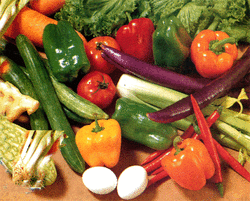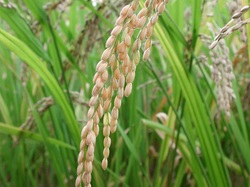|
|
DO NOT EAT HALAL MEAT!
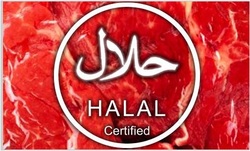
THIS IS COMING AND LOOK OUT FOR THIS INTRUSION IN U.S. and CANADIAN MARKETS... “Halal”meat... are you aware of this? Take a look and forward to your friends and family. Do Not buy this meat!
"Costco stocking their meat counters with "Halal" meat."
I shopped for groceries at my local Wal-Mart. As usual, I bought a bag of frozen chicken breasts, but this time I checked to make sure the meat was not labeled "Halal." Here's why:
Halal is the Islamic term that basically means the meat is lawful to eat for a devout Muslim. What makes it lawful or acceptable is that the meat has been processed in a very specific way. Unlike kosher food, where the physical processing of the meat is the focus, for Islam it is the spiritual component that makes the meat lawful.
For lawful (halal) meat in Islam, the animal must be killed while the butcher faces Mecca, and either the butcher cries "Allah Akbar" or a tape plays the words over a loud speaker. Ann Barnhardt is a cattle commodities broker, has more about "Halal."
NEVER buy meat that is marked as "Halal." I am in the cattle business, and believe me when I tell you that Halal kill plants are CONSTANTLY being cited and shut down by the USDA for horrific infractions. Most of these plants are in Michigan and upstate New York..
One of the things that halal kill plants are notorious for is putting already-dead animals in the human consumption line. They will go pick up a dead cow off of a farm or ranch and instead of putting it in their rendering tank where the resulting "tankage" is worth pennies on the dollar as pet food or industrial products, they will shackle the dead animal on the normal kill line and process it as human food which is the highest-dollar product.
Since Islam teaches dishonesty (taqiyyah) and no regard for one's neighbor, this kind of sickening behavior is standard. Halal plants are also notorious for general citations for filth and uncleanliness. I have toured normal cattle slaughter plants, and guys, you could eat off of the floor. Everything is white and men walk around with water hoses and steam guns constantly keeping everything in a state of spotlessness.
Halal plants are filthy. A lot of Halal meat is also labeled as "organic." Again, don't be fooled into thinking that "halal" means "better." It isn't. I would never, ever knowingly eat halal meat purely from a food safety perspective.
"Costco stocking their meat counters with "Halal" meat."
I shopped for groceries at my local Wal-Mart. As usual, I bought a bag of frozen chicken breasts, but this time I checked to make sure the meat was not labeled "Halal." Here's why:
Halal is the Islamic term that basically means the meat is lawful to eat for a devout Muslim. What makes it lawful or acceptable is that the meat has been processed in a very specific way. Unlike kosher food, where the physical processing of the meat is the focus, for Islam it is the spiritual component that makes the meat lawful.
For lawful (halal) meat in Islam, the animal must be killed while the butcher faces Mecca, and either the butcher cries "Allah Akbar" or a tape plays the words over a loud speaker. Ann Barnhardt is a cattle commodities broker, has more about "Halal."
NEVER buy meat that is marked as "Halal." I am in the cattle business, and believe me when I tell you that Halal kill plants are CONSTANTLY being cited and shut down by the USDA for horrific infractions. Most of these plants are in Michigan and upstate New York..
One of the things that halal kill plants are notorious for is putting already-dead animals in the human consumption line. They will go pick up a dead cow off of a farm or ranch and instead of putting it in their rendering tank where the resulting "tankage" is worth pennies on the dollar as pet food or industrial products, they will shackle the dead animal on the normal kill line and process it as human food which is the highest-dollar product.
Since Islam teaches dishonesty (taqiyyah) and no regard for one's neighbor, this kind of sickening behavior is standard. Halal plants are also notorious for general citations for filth and uncleanliness. I have toured normal cattle slaughter plants, and guys, you could eat off of the floor. Everything is white and men walk around with water hoses and steam guns constantly keeping everything in a state of spotlessness.
Halal plants are filthy. A lot of Halal meat is also labeled as "organic." Again, don't be fooled into thinking that "halal" means "better." It isn't. I would never, ever knowingly eat halal meat purely from a food safety perspective.
|
|
|
|
"It’s said that for bees, the flower is the fountain of life, and for flowers bees are the messengers of love.” Dennis vanEngelsdorp
|
POLLINATION:
|
Top Genetically Modified Foods! Danger!
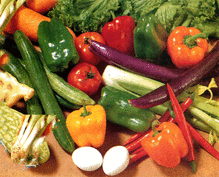
There is a conspiracy of selling out happening in America. Politics and personal interest it would seem determine government policies over and above health and safety issues. When President Obama appointed Michael Taylor in 2009 as senior adviser for the FDA, a fierce protest ensued from consumer groups and environmentalists. Why? Taylor used to be vice president for Monsanto, a multinational interested in marketing genetically modified (GM) food. It was during his term that GMO's were approved in the US without undergoing tests to determine if they were safe for human consumption.
The danger of GMO'sThe question of whether or not genetically modified foods (GMO's) are safe for human consumption is an ongoing debate that does not seem to see any resolution except in the arena of public opinion. Due to lack of labeling, Americans are still left at a loss as to whether or not what is on the table is genetically modified. This lack of information makes the avoiding and tracking of GM foods an exercise in futility. Below are just some of the food products popularly identified to be genetically modified. Learn more: |
Human genes engineered into experimental
|
Food Activists "Slime" Healthy Beef Product
New York, NY / Washington, D.C. - School districts around the country are now deciding whether to continue using a type of ground meat, pejoratively labeled "pink slime" by food activists, that has been used safely for years. If school administrators abandon the science by buying into the "pink slime" hype, they'll not only be setting a bad example for their students, they'll be wasting taxpayer dollars, says the National Center for Public Policy Research.
In charges outlined in an op-ed in Friday's New York Post, the National Center for Public Policy Research's Jeff Stier writes, "Let's be clear: The meat product known as 'lean finely textured beef' does look gross. But so does just about every meat product - ever seen how they make pastrami? And this stuff is perfectly safe, and almost certainly healthier than its likely replacement." READ MORE --> |
Armed Raids On Small MI Pig Farmers !
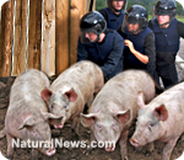
Natural News can now confirm that the Michigan Department of Natural Resources has, in total violation of the Fourth Amendment, conducted two armed raids on pig farmers in that state, one in Kalkaska County at Fife Lake and another in Cheboygan County. Staging raids involving six vehicles and ten armed men, DNA conducted unconstitutional, illegal and arguably criminal armed raids on these two farms with the intent of shooting all the farmers' pigs under a bizarre new "Invasive Species Order" (ISO) that has suddenly declared traditional livestock to be an invasive species.
The ISO also deems farmers who raise these pigs to be felons, and DNR officials were ready to make arrests on the scene and haul away these farmers to be prosecuted as hardened criminals. "I think this is an unconstitutional order, these actions of the DNR are way out of bounds," attorney Joseph O'Leary told Natural News in an interview today. He is representing one of the farmers who was targeted in these raids. READ MORE --> |
|
|
|
RAW MILK - BETTER FOR YOUR FAMILY?
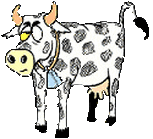
Raw Milk is a living food rich in bio-available micro-nutrients and macro-nutrients derived from healthy, grass fed pastured cows free of antibiotic's and hormones just like nature intended. Pasteurized dairy is a dead food with denatured, bio-unavailable nutrients that creates inflammation in the body leading to bodily dysfunction.
This video takes a look at the history or milk and provides an easy to understand comparison between raw milk and pasteurized/homogenized milk. Make the choice that's best for you.
WHY IS THE GOVERNMENT SO INTERESTED IN WHETHER WE CHOOSE TO DRINK RAW OR WHOLE MILK - MAYBE THE MILLIONS $$ DAIRY INDUSTRY?
Senate Bill 510
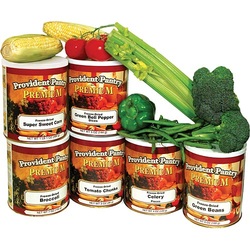
Title I - Improving Capacity to Prevent Food Safety Problems Amends the Federal Food, Drug, and Cosmetic Act (FFDCA) to expand the food safety activities of the Secretary of Health and Human Services (HHS), including to authorize the Secretary to inspect records related to food. Exempts certain establishments that sell food directly to consumers, such as roadside stands, farmers markets or participants in a community supported agriculture program, from specified requirements of this Act. Requires each owner, operator, or agent in charge of a food facility to identify and implement preventive controls to significantly minimize or prevent hazards that could affect food manufactured, processed, packed, or held by such facility. Sets forth provisions governing exemptions from such requirements for certain facilities. Requires the Secretary to: (1) issue guidance documents to reduce the risk from the most significant food borne contaminants; and (2) establish minimum standards for the safe production and harvesting of fruits and vegetables based on known safety risks. Authorizes the Secretary to issue exemptions and variances from such standards. Directs the Secretary to assess and collect fees related to: (1) food facility re-inspection; (2) food recalls; (3) the voluntary qualified importer program; and (4) importer re-inspection. Directs the Secretary to develop voluntary food allergy and anaphylaxis management guidelines for schools and early childhood education programs.
Title II - Improving Capacity to Detect and Respond to Food Safety Problems Requires the Secretary to: (1) allocate resources to inspect facilities and imported food according to the known safety risks of the facilities or food; and (2) establish a product tracing system to track and trace food that is in the United States or offered for import into the United States. Requires the Secretary, acting through the Director of the Centers for Disease Control and Prevention (CDC), to enhance food borne illness surveillance systems to improve the collection, analysis, reporting, and usefulness of data on food borne illnesses. Gives the Secretary the authority to order a recall of an article of food.
Title III - Improving the Safety of Imported Food Requires U.S. importers to perform risk-based foreign supplier verification activities to verify that imported food is produced in compliance with applicable requirements related to hazard analysis and standards for produce safety and is not adulterated or mis-branded. Requires the Secretary to establish a program to expedite review and importation of food offered for importation by U.S. importers who have voluntarily agreed to participate in such program. Authorizes the Secretary to: (1) require a certification that an article of food imported or offered for import complies with applicable requirements of this Act; and (2) enter into arrangements and agreements with foreign governments to facilitate the inspection of registered foreign facilities. Requires food to be refused admission into the United States if permission to inspect the food facility is denied by the facility owner, operator, or agent or the foreign country. Sets forth provisions governing the establishment of a system to recognize bodies that accredit third-party auditors and audit agents to certify that foreign entities meet applicable FFDCA requirements for importation of food into the United States.
Title IV - Miscellaneous Provisions Authorizes appropriations for FY2011-FY2015 for the activities of the Center for Food Safety and Applied Nutrition, the Center for Veterinary Medicine, and related field activities in the Office of Regulatory Affairs of the Food and Drug Administration (FDA). Directs the Secretary to increase the field staff of such Centers and Office. Establishes whistle blower's protections for employees of entities involved in the manufacturing, processing, packing, transporting, distribution, reception, holding, or importation of food who provide information relating to any FFDCA violation.
Title II - Improving Capacity to Detect and Respond to Food Safety Problems Requires the Secretary to: (1) allocate resources to inspect facilities and imported food according to the known safety risks of the facilities or food; and (2) establish a product tracing system to track and trace food that is in the United States or offered for import into the United States. Requires the Secretary, acting through the Director of the Centers for Disease Control and Prevention (CDC), to enhance food borne illness surveillance systems to improve the collection, analysis, reporting, and usefulness of data on food borne illnesses. Gives the Secretary the authority to order a recall of an article of food.
Title III - Improving the Safety of Imported Food Requires U.S. importers to perform risk-based foreign supplier verification activities to verify that imported food is produced in compliance with applicable requirements related to hazard analysis and standards for produce safety and is not adulterated or mis-branded. Requires the Secretary to establish a program to expedite review and importation of food offered for importation by U.S. importers who have voluntarily agreed to participate in such program. Authorizes the Secretary to: (1) require a certification that an article of food imported or offered for import complies with applicable requirements of this Act; and (2) enter into arrangements and agreements with foreign governments to facilitate the inspection of registered foreign facilities. Requires food to be refused admission into the United States if permission to inspect the food facility is denied by the facility owner, operator, or agent or the foreign country. Sets forth provisions governing the establishment of a system to recognize bodies that accredit third-party auditors and audit agents to certify that foreign entities meet applicable FFDCA requirements for importation of food into the United States.
Title IV - Miscellaneous Provisions Authorizes appropriations for FY2011-FY2015 for the activities of the Center for Food Safety and Applied Nutrition, the Center for Veterinary Medicine, and related field activities in the Office of Regulatory Affairs of the Food and Drug Administration (FDA). Directs the Secretary to increase the field staff of such Centers and Office. Establishes whistle blower's protections for employees of entities involved in the manufacturing, processing, packing, transporting, distribution, reception, holding, or importation of food who provide information relating to any FFDCA violation.
